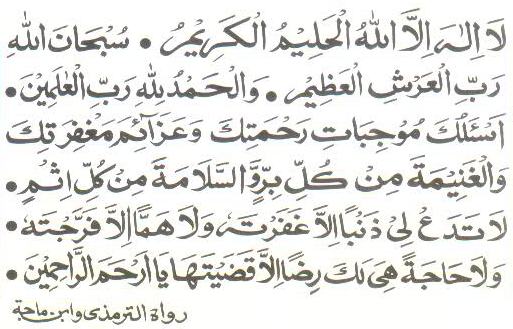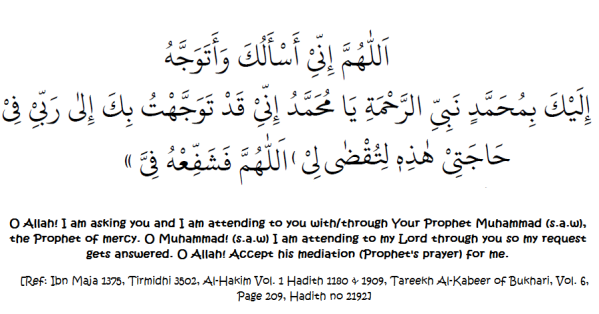Salaatul Hajaat : A Powerful Prayer for every need
Posted by islamicexorcism on November 12, 2011
Salaatul Hajaat is a prayer offered for the accomplishment of a particular purpose or need. It consists of a fresh ablution done carefully, followed by a calm prayer of two units of salaat, then a sincere supplication that states what one wishes to be accomplished and requesting Allah Ta’ala’s for his help and assistance in its accomplishment.
Almighty Allah says in the holy Quran : “And seek help with patience and salah, verily this is difficult but for the submissive servants.”[Surah Baqrah Verse 45]
Human beings are always in need of Allah’s mercy and bounties, regardless of a person being in adversity or not, and therefore he has commanded us to seek his help, in a manner which pleases him and is taught to us by our Prophet SAW
A hadith states that Huzaifa (R.A.) said, ‘Whenever a matter became serious, the Prophet SAW turned to Salaah. (Recorded by Ahmad, Abu Dawood, Hafiz ibn Hajar has quoted it in his book Fathul Baari and has said, ‘It is with a good sanad’), furthermore, Imam Ahmad RA has on sound authority reported from Abu Darda RA that the Prophet SAW said: “He who makes wudu, and does it properly, then prays two rak’at, Allah will grant him whatever he may pray for, sooner or later.”
The tradition shows that the Prophet SAW himself would turn to Salaah whenever he was affected or confronted with anything. As such, a need is one which is a matter of seriousness and turning to Salaah and supplication is indeed one of the best ways to fulfil it. In fact the believers are ordered in the Holy Quran to ‘Seek help in patience and Salaah’. Hence, turning to Salaah for assistance in fulfilling one’s need is from the guidance which Allah has given to the believers in the Holy Quran.
Many traditionists and jurists have generally accepted the act of Salaatul Hajaat as one that is commendable and encouraged act of seeking assistance from Allah. It is with respect to this general acceptance, we see that many of the great and reliable jurists and scholars of the former and latter times have dedicated a chapter in their respective books called ‘Salaah Al Hajaat’.
Fatwa’s regarding Salatul Hajaat from Hanafi Sources: Salaatul Hajaat is essentially to raise one’s need to Allah Most High, by performing ritual ablution (Wudu), praying 2 Rakats, and then making whole-hearted Dua to Allah. If one uses the mentioned Prophetic supplication, or other similar supplications transmitted from the Beloved Messenger of Allah SAW, it is best. (Al-Fatawa al-Hindiyya; Ibn Abidin, Radd al-Muhtar)
In this manner, the act of performing Salaah Al Hajah has been endorsed and recorded by many leading traditionists and jurists from among the former and latter scholars in their respective books.
As such, it is one which is commendable and acceptable in the teachings of Islam. It is not fabricated, nor is it a Bid’ah. The handful of people and their respective scholors who discourage people from practising Salaatul Hajaat should in fact follow these ahadith in which we have been strictly instructed to follow the majority and not deviate from the majority…
1. The holy Prophet(Sallal laahu alaihi wasallam) said “Without doubt my Ummah will never be gathered in misguidance. Whenever you see disagreement, then hold fast to the Sawad-e-Azam (the great majority)” [Ibne Majah]
2. The holy Prophet(Sallal laahu alaihi wasallam) said ” Follow the way of the largest group of Muslims! For, he who deviates from this group will be thrown into Hell!” [Ibne Majah]
3. The holy Prophet(Sallal laahu alaihi wasallam) said ” Allah will never allow my Ummah to unite upon misguidance and incorrect beliefs. Allah’s mercy, blessings and protection are with the largest group of Muslims. And he who deviates from this largest group of Muslims will be thrown into Hell.” [ Tirmizi]
4. The holy Prophet(Sallal laahu alaihi wasallam) said ” He who deviates from the largest group of Muslims, even as much as a hand span, has himself cut off his connection with Islam.” [Abu Daud, Imam Ahmed]
The inward manners of supplication is exhibiting our neediness and absolute slavehood to Allah, consigning one’s matters to Allah, and knowing that the only one who gives or benefits is Allah Most High. With this, one should be certain that Allah Most High answers our duas, but in the way He knows is best for us.
When circumstances do not permit us to pray 2 rakats, one should still turn to Allah in supplication, raising one’s needs to Him, for He answers our supplications and loves being asked.
Important Notes related to Salaatul Hajaat
1.Put on clean clothes and make wadhu with full concentration and use miswaak if possible as it would increase the blessings of salaat.
2.Select a clean place free from all distractions so that the salaat can be offered with full concentration.
3.Women ensure you are covering your hair as per the hajaab rulings essential for any salaat.
4.The entire amal of salaatul Hajaat should be done with full concentration, and imagining that Allah is seeing your every action and is listening to every word, keeping this in mind, try to please Allah with the best salaat, best Qiraat, maximum humbleness and humility considering yourself as a beggar in need.
5.Offer 2 units salaat patiently, with prolonged qirat, prolonged ruku and sajdah and never hurry up.
6.Understand and ponder over the meaning of prophetic dua’s used in Salaatul Hajaat as it would make the dua effective.
7.One should offer salaatul Hajaat every day or night, till one is convinced that his need is being fulfilled by Allah.
Format of Salaatul Hajaat
This format is not from hadith related to Salaatul Hajaat (however, it is derived from other ahadith and practices of pious) and hence its not mandatory to follow this while offering salaatul hajaat. We are sharing this format based on our knowledge, inshaAllah, this format will make the amal makbool/ acceptable in the sight of Allah.
After offering 2 units salaatul Hajaat and before getting up or moving from the place of salaat, facing qiblah, raise your hands for dua and recite
1.Aoozubillaahi Mi-nash ShYataan Ir-rajeem BisMillaah Ir-Rah-maan Ir-Ra-heem -1x
2.Surah Fatiha -1x when you come to the verse ‘Iyyaka Na Budu Wa Iyyaka Nastaaeen’ recite it 11x and then complete surah fatiha , Surah Iqlaas-3x
3.Any Darood -easy one – ALLAH humma Sali’ala Muhammad Sallallaahu `Alayhi wa Sallam -3x
4.Recite Allah’s name – “Ya Arhamar Raahemeen” atleast 7x or more the better
5.Recite either dua 1 or dua 2 of Salaatul hajaat explained below – at least 3x or more
6.Make dua for your need and repeat your need before Allah atleast 3x
7.Any Darood -easy one – ALLAH humma Sali’ala Muhammad Sallallaahu `Alayhi wa Sallam -3x
8.AMEEN. AMEEN. YA RABBIL ‘A-LAMEEN.
9.Blow 3x over the chest, then 3x into both the hands, and the wipe the hands over the face, arms and body.
Dua 1 of Offering Salaatul Hajaat

Hazrat Abullah ibn Abi Awfa RA relates that the Messenger of Allah (Sallallahu Alaihi Wasallam) said, “Whoever has a need with Allah, or with any human being, then let them perform ritual ablutions well and then pray two Rakats. After that, let them praise Allah and send blessings on the Prophet (Sallallahu Alaihi Wasallam). After this, let them say: “La ilaha illallahul Halimul karim, Subhanallahi Rabbil Arshil Azim, Alhamdulillahi Rabbil Alamin, Asaluka Mujibaati Rahmatika Wa Azaa’ima maghfiratika Wal Ghanimata Min Kulli Birrin, Was salamata Min Kulli Ithmin, La Tada’ Li Zanmban Illa Ghafartahu, Wa la Hamman Illa Farrajtahu, Wa la hajatan hiya Laka Ridhan Illa Qadhaitaha, Ya Arhamar Rahimeen.”
Meaning: There there no god but Allah the Clement and Wise. There is no god but Allah the High and Mighty. Glory be to Allah, Lord of the Tremendous Throne.
All praise is to Allah, Lord of the worlds. I ask you (O Allah) everything that leads to your mercy, and your tremendous forgiveness, enrichment in all good, and freedom from all sin. Do not leave a sin of mine (O Allah), except that you forgive it, nor any concern except that you create for it an opening, nor any need in which there is your good pleasure except that you fulfill it, O Most Merciful!
(Related by Tirmidhi and Ibn Majah. The Hadith has some weakness, but it is slight: such Hadiths are acted upon for virtuous deeds (fada’il al-a`mal) by general agreement of the scholars. Furthermore, it has been practiced over the years from the time of the Sahabah (Radiallahu Anhum) until now.)
In this regard, the celebrated Muhaddith (traditionist) and Faqeeh (jurist), Ibn Qudama (died 620 A.H.) has mentioned ‘the chapter of Salaah Al Hajah in his famous and authentic book, ‘Al Mugni’. In this he writes ‘The chapter of Salaah Al Hajah’. From Abdullah bin Abi Awfa (R.A.), he said that the Messenger of Allah (S.A.S.) said, ‘whoever has a need from Allah or from any of the children of Adam, let him perform wazu and do it good. Then let him perform two rakaats and glorify Allah and send blessings upon the Prophet. Then he should say, ‘La ilaha Illalahul Kareem …..’. (Al Mugni Vol. 1 Pg. 134)
Dua 2 of offering Salaatul Hajaat

On the authority of Hazrat Uthman bin Hunaif RA that a blind man came to the Messenger of Allah (Sallallahu Alaihi Wasallam) and asked him to invoke Allah so that he is cured. The Prophet replied that invocation could be postponed if he wanted to since it would be better for him that way or he (Prophet) could supplicate for him (right now). He asked to supplicate. The Prophet ordered him for a well performed ablution and to pray two raka’at and then follow it with the following supplication: “O Allah! I am asking you and I am attending to you with/through Your Prophet Muhammad (s.a.w), the Prophet of mercy. O Muhammad! (s.a.w) I am attending to my Lord through you so my request gets answered. O Allah! Accept his mediation (Prophet’s prayer) for me.
[Ref: Ibn Maja 1375, Tirmidhi 3502, Al-Hakim Vol. 1 Hadith 1180 & 1909, Tareekh Al-Kabeer of Bukhari, Vol. 6, Page 209, Hadith no 2192]
Sorry, the comment form is closed at this time.